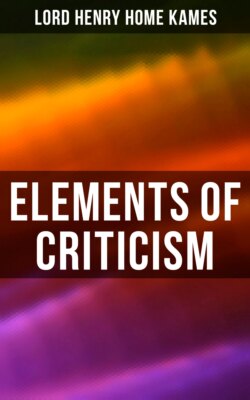Читать книгу Elements of Criticism - Lord Henry Home Kames - Страница 20
На сайте Литреса книга снята с продажи.
PART VI. Of the resemblance emotions bear to their causes.
ОглавлениеTable of Contents
THat many emotions bear a certain resemblance to their causes, is a truth that can be made clear by induction; though, so far as I know, the observation has not been made by any writer. Motion, in its different circumstances, is productive of feelings that resemble it. Sluggish motion, for example, causeth a languid unpleasant feeling; slow uniform motion, a feeling calm and pleasant; and brisk motion, a lively feeling that rouses the spirits and promotes activity. A fall of water through rocks, raises in the mind a tumultuous confused agitation, extremely similar to its cause. When force is exerted with any effort, the spectator feels a similar effort as of force exerted within his mind. A large object swells the heart. An elevated object makes the spectator stand erect.
Sounds also produce emotions that resemble them. A sound in a low key, brings down the mind. Such a sound in a full tone, hath a certain solemnity, which it communicates to the emotion produced by it. A sound in a high key, chears the mind by raising it. Such a sound in a full tone, both elevates and swells the mind.
Again, a wall or pillar that declines from the perpendicular, produceth a painful emotion, as of a tottering and falling within the mind. An emotion somewhat similar is produced by a tall pillar that stands so ticklish as to look like falling. For this reason, a column upon a base looks better than upon the naked ground. The base, which makes a part of the column, inspires a feeling of firmness and stability. The ground supporting a naked column, is too large to be considered as its base. And for the same reason, a cube as a base, is preferred before a cylinder, though the latter is a more beautiful figure. The angles of a cube, being extended to a greater distance from the centre than the circumference of a cylinder, give the column a greater appearance of stability. This excludes not a different reason, that the base, shaft, and capital, of a pillar, ought, for the sake of variety, to differ from each other. If the shaft be round, the base and capital ought to be square.
A constrained posture, uneasy to the man himself, is disagreeable to the spectator; which makes it a rule in painting, that the drapery ought not to adhere to the body, but hang loose, that the figures may appear easy and free in their movements. Hence the disagreeable figure of a French dancing-master is one of Hogarth’s pieces. It is also ridiculous, because the constraint is assumed and not forced.
The foregoing observation is not confined to emotions raised by still life. It holds also in those which are raised by the qualities, actions, and passions, of a sensible being. Love inspired by a fine woman, assumes her qualities. It is sublime, soft, tender, severe, or gay, according to its cause. This is still more remarkable in emotions raised by human actions. It hath already been remarked[46], that any signal instance of gratitude, beside procuring esteem for the author, raiseth in the spectator a vague emotion of gratitude, which disposeth him to be grateful. I now further remark, that this vague emotion, being of the same kind with what produced the grateful action, hath a strong resemblance to its cause. Courage exerted inspires the reader as well as the spectator with a like emotion of courage. A just action fortifies our love to justice, and a generous action rouses our generosity. In short, with respect to all virtuous actions, it will be found by induction, that they lead us to imitation by inspiring emotions resembling the passions that produced these actions. And hence the benefit of dealing in choice books and in choice company.
Grief as well as joy are infectious: the emotions they raise in a spectator resemble them perfectly. Fear is equally infectious: and hence in an army, fear, even from the slighted cause, making an impression on a few, spreads generally through all, and becomes an universal panic. Pity is similar to its cause. A parting scene betwixt lovers or friends, produceth in the spectator a sort of pity, which is tender like the distress. The anguish of remorse, produceth pity of a harsh kind; and if the remorse be extreme, the pity hath a mixture of horror. Anger I think is singular; for even where it is moderate and causeth no disgust, it disposes not the spectator to anger in any degree[47]. Covetousness, cruelty, treachery, and other vicious passions, are so far from raising any emotion similar to themselves, to incite a spectator to imitation, that they have an opposite effect. They raise abhorrence, and fortify the spectator in his aversion to such actions. When anger is immoderate, it cannot fail to produce the same effect.
